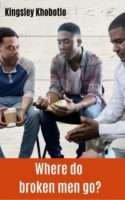An hour later, still at the coffee shop.
COACH MASUKU: Would anyone else like to come up and share something with the group? (looks around) Well, in that case…
(Makgatho stands up in the back corner of the room and makes his way to the front.)
COACH MASUKU: Ahh! (beaming once more) Makgatho, please come forward.
(When Makgatho reaches the front, Coach Masuku smiles at him and whispers something in his ear, gently squeezing his tense shoulders before taking his seat.)
MAKGATHO: (reaches inside his blazer pocket and produces a folded piece of paper) The coach asked me to write a letter to my late father and tell him, my father, everything I wish I had the opportunity to tell him all those years ago. Tonight I would like to read that letter to you.
(The room is still. Coach Masuku crosses his legs and leans back in his chair.)
MAKGATHO: (starts to read) Dear Father, for a long time I hated you and cursed the day I first laid eyes on you. You have brought Mom and I nothing but heartache and misery. To this day, the smell of alcohol brings back painful memories of those many nights when… (pauses and looks towards Coach Masuku)
COACH MASUKU: (nods encouragement once more)
MAKGATHO: (takes a few deep breaths to try to control his anger and then continues reading) Loud noises leave my nerves shattered thanks to you, and to this day I can still hear Mom screaming when I close my eyes. The images of her… (lowers his head and pinches the bridge of his nose between his thumb and index finger) trying to get away from you as you lunge across the table fills me with hatred that forces me to… (clenches his fist in an attempt to control the pain)
(Coach Masuku leans forward with his eyes closed and rests his elbows on his knees and brings his hands together, as if in prayer.)
MAKGATHO: (makes direct eye contact with some in the group) This group — all of you — have rescued me from those painful memories that have haunted me for so many years. You have made me realise that you actually did teach me something: I never…(pauses) EVER want to put my children through what you put us through! (looks up to find a few heads nodding) You see, we live in a violent society that is filled with men who are confused and hurting, like me. The traditional role of men as we know it needs to change. (a few nods and murmurs of agreement) And the relentless assault on the dignity and person of women and children must stop! It starts with you! (points at Hendrik) And you! (points at Thabo) And me! (he points to himself) It starts with all of us!
COACH MASUKU: (yells) Preach!
MAKGATHO: If we, the current generation, accept that we live in a patriarchal society, then we need to acknowledge that the role of a man has to evolve. Must evolve! Being a man is not about going out drinking all night only to come home to terrorise your wife or girlfriend in front of your children. What message are you sending to your son by hitting his mother? What is your little girl’s self-worth going to be some day when she reaches dating age?
THABO: Bua!
MAKGATHO: Now is the time for us men to teach the boy-child to be part of a generation that will say, “Not in our name!” Not in our name will female students on university campuses continue to be raped and killed. Not in our name will grandmothers, mothers, and daughters fear to speak their mind or be successful, because some of us have fragile egos. Not in our name will sons continue to grow up without fathers. Not in our name will a man’s hand continue to be perceived as a source of pain. NOT IN OUR NAME!
(Men rise and applaud excitedly.)
(Makgatho is surprised at the reception.)
COACH MASUKU: Now we are talking, gents!
MAKGATHO: (focuses back on the letter in his hand and reads) That’s what you have taught me, Father. You have taught me that I don’t want to be anything like you. I don’t want the vicious cycle of abuse to be inherited and continued by my children. It stops here! (gestures with his index finger, pointing to the floor for emphasis) Now! I’m taking back what you robbed me of, and with the help of Coach Masuku and these like-minded men (gestures at them with a sweeping hand), creating an environment in which women can walk down the street without having to look over their shoulders. From now on, a man who beats his wife must know that if I, as a neighbour, hear her scream, he might as well call the police himself.
(The men cheer and give a standing ovation.)
MAKGATHO: (now shouting over the buoyant group of men) Thank you, Dad, for making me realise the kind of man I don’t want to become!
COACH MASUKU: During the dark days of apartheid, it was the women who ran the households, held the family together, while their husbands took the train to go and work in a mine hundreds of kilometres away, for months at a time. It was the women who had to raise the children when their husbands were arrested for not carrying a dompas. It was the women who said, we will march to the Union Buildings in 1956. It was the women who sacrificed so much for us, for this country.
Tell us: Why do you think we have such a problem with domestic violence in South Africa? How do you think we can work to solve it?


